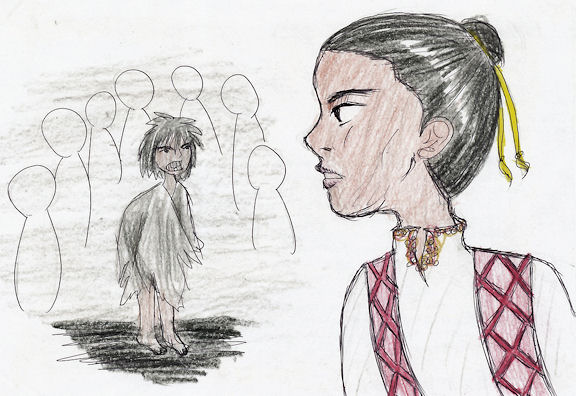
"Please get away from him. You could become infected and end up just like him."
Drawing by Anna Owaki, Eleanor Roosevelt College (UCSD), Class of 2009, by permission
Xīdá-duō begged and begged his father to let him go out in secret to see the real world. Not a world where all the poor and old and ugly people had been hidden away, but the world as it really was.
At length and with great reluctance the kindly king agreed. His son wanted to see ordinary people, poor people, working people. But King Jìngfàn still dared hope that the most ugly and untoward aspects of life could be kept out of sight.
This time Xīdá-duō made his trip with Chēnì on foot, and not in a royal chariot. They went out the west gate of the palace compound dressed as ordinary townsfolk so as not to be recognized. Xīdá-duō saw smiths and farmers and cart drivers and all sorts of people. He visited all sorts of shops, selling baubles and food and all things else. This time he was delighted. If there was work, there was also rest, and if there was sadness, there was also joy. The world was a good place after all.
But in the end, of course, something unfortunate happened to spoil his delight, just as it had before. Xīdá-duō heard a moan, which seemed to come from a pile of rubbish beside the road. Looking down he saw beside the road a man afflicted with a plague, all twisted up and lying in the mud, his skin covered with pocks. The very sight of him made the prince nauseous.
With each movement the man groaned in pain. And the sound of him filled the prince with pity.
Overcoming his disgust, and ignoring strong objections from Chēnì, Xīdá-duō went to the man and asked him what his problem was, but the man was too weak to talk. Indeed even groaning seemed only to make his pain more severe.

Xīdá-duō was full of questions, and he was frustrated that the man apparently was unable to talk to him. He asked Chēnì what this was all about. The chariot driver told him to avoid the man because he was an invalid, and his blood contained some kind of poison, for he had become infected with a disease.
"Can this happen to anyone?" asked the prince.
"Yes, anyone," answered Chēnì. Please get away from him. You could become infected and end up just like him."
Chēnì didn't want to talk about it, but Xīdá-duō didn't want to talk about anything else.
Bit by bit he extracted from Chēnì the fact that illness was common and that it came in many forms. And that it could strike anyone, even princes. Some diseases, he learned, could be very serious, like the disease that had struck the man with the plague.
"In fact," said Chēnì, "a person can even die from such diseases." The words had no sooner left Chēnì's mouth than he knew he should not have said them. The prince, after all, still didn't know about death. But now Chēnì knew that that would be next.
"Die? What does that mean?" asked Xīdá-duō as they turned towards home. Chēnì drove in silence. This was not turning out at all well, and he didn't want to be responsible for any more trouble than he had already caused.
"Tell me, Chēnì!" pleaded the prince. "What does it mean to 'die'?"
Chēnì drove on, miserable, in silence. The King was not going to be happy.